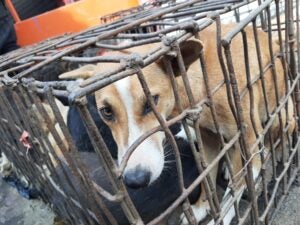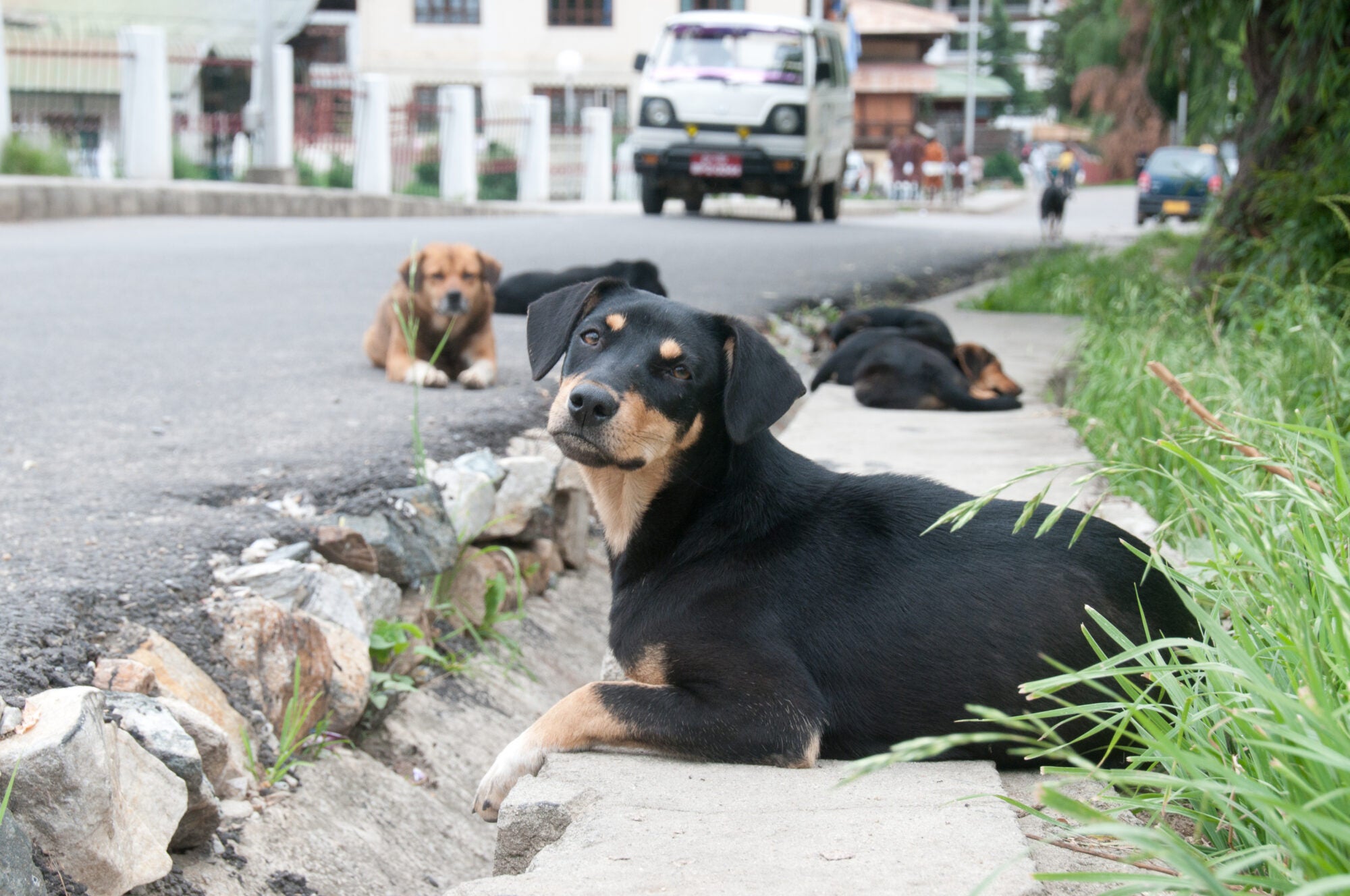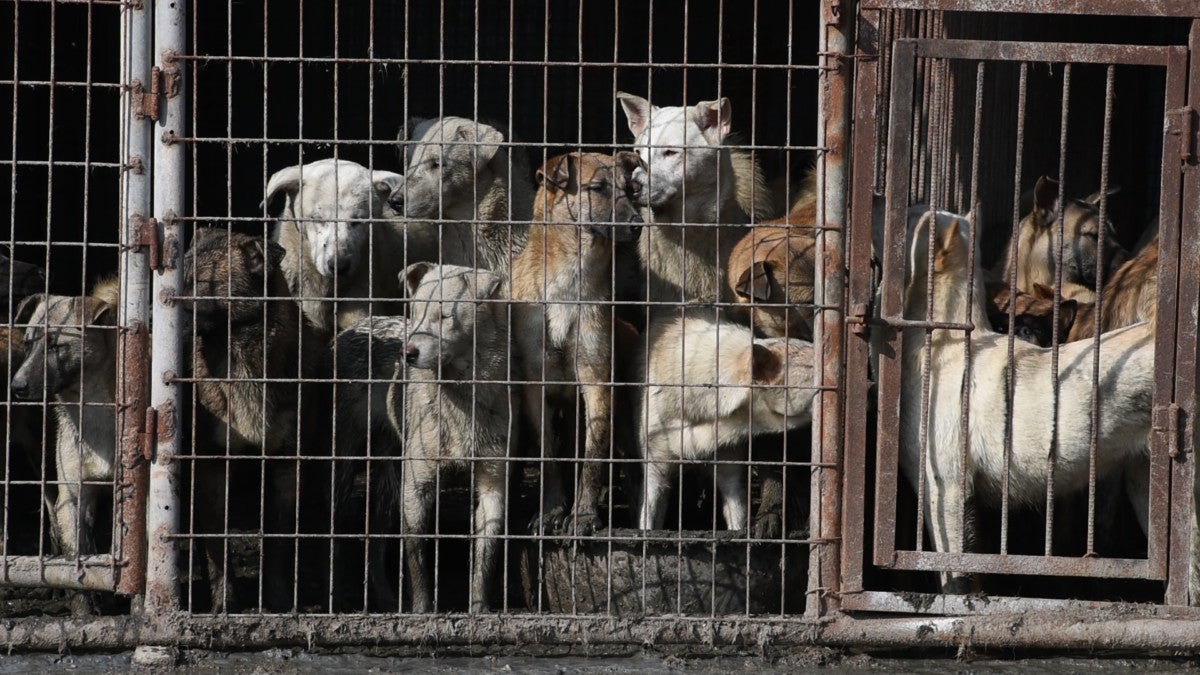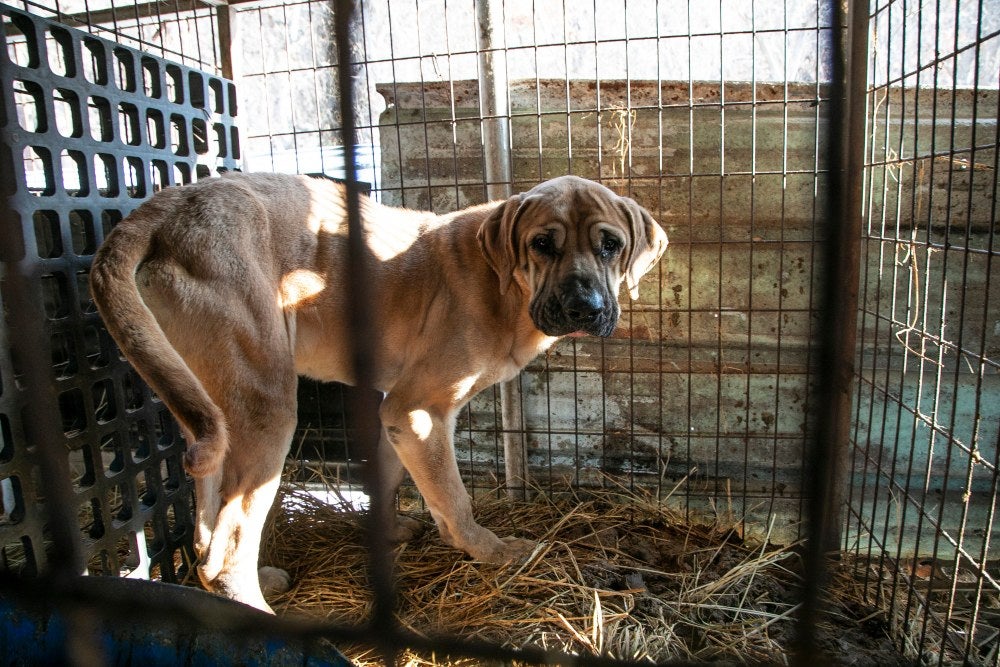
Indonesia President Joko Widodo and local leaders are facing pressure to shut down the country’s criminal dog meat trade after sickening new video released by the Dog Meat Free Indonesia coalition—of which Humane Society International is a member—revealed horrific animal cruelty and public health risks at wet markets on the island of Sulawesi. Dog and cat meat is seen being sold at the markets, which sell meat, produce and other perishable items, alongside bush-meat including meat from bats, snakes and wild boar in scenes similar to those found in Wuhan, China where the SARS-CoV-2 virus is believed to have originated.
Across Indonesia, an estimated 1 million dogs are killed for their meat annually. While a crackdown on the trade is being seen in parts of Indonesia, authorities in Sulawesi—a 70,000 square mile island with a population of nearly 20 million people—have failed to act.
An investigator for DMFI infiltrated criminal gangs and traders who steal at least 4,500 pets and roaming dogs every month from villages in South Sulawesi. The shocking and disturbing undercover video shows traffickers hoisting terrified and screaming dogs by the neck from an underground pit as they are repeatedly bludgeoned across the face and head. Other scenes at the markets show cages of dogs huddling together as nearby lifeless bodies of other dogs—some still alive—are blowtorched to remove their fur for sale to customers. Next, the meat is sold to local restaurants and at wet markets. Some dogs are trafficked from as far away as Makassar, South Sulawesi’s capital, a 40-hour gruelling journey covering 1,000 miles.
Lola Webber, End Dog Meat campaigns director for Humane Society International, a DMFI member group, said: “This is some of the worst animal cruelty we have seen—gangs and traders stealing and bludgeoning thousands of terrified, screaming dogs every month from villages. Many of them are beloved family companions. They are torn away and abused by these criminals in broad daylight, scared and helpless. All of this to be sold for their meat in restaurants and at wet markets on display alongside bats, snakes and wild boar. Despite the serious public health risks associated with these markets, Sulawesi’s roughly 200 traditional markets are still operating business as usual. With Indonesia still in the grip of the COVID-19 pandemic, it is a matter of urgency that President Widodo take action immediately to stop this dangerous and illegal trade.”
The DMFI investigator, who is not being named for his own protection, said: “The scale of the dog meat trade was really surprising. Thieves are stealing dogs from all over the island before selling them to the traders who warehouse them until they have enough to sell on. Mentally, this was a harrowing mission because every day I could see how utterly terrified and traumatized these poor dogs were. All around them they witness other dogs being dragged by the neck, beaten over the head, thrown around violently. They would tremble in fear when approached. Like me, the vast majority of Indonesians will be sickened by what I saw. This trade brings shame on Indonesia.”
DMFI—which comprises local campaigners Jakarta Animal Aid Network and Animals Friends Jogja, and international groups Humane Society International, Four Paws and Animals Asia—is now seeking urgent meetings with the provincial and city authorities in Tomohon, Manado, Minahasa and Makassar to call for urgent action. The coalition of animal groups already works successfully with police and local governments in multiple other regions to crack down on the trade. In November 2021 DMFI joined Sukoharjo police in Java on a sting operation at an illegal dog slaughterhouse that saw more than 50 dogs rescued.
At least eight national laws and regulations exist that, if enforced, would serve to prohibit the dog meat trade, and thus far five regions in have passed explicit bans on the dog meat trade. Karanganyar passed a ban in 2019. Sukohrajo and Salatiga City passed bans in 2021. Semarang, which is the provincial capital of Central Java, passed a ban earlier this year. DMFI now invites the Sulawesi authorities to follow suit.
Dog meat trade facts:
- Although demand for dog meat is higher in Sulawesi than the rest of Indonesia, latest opinion polling by Nielsen (2021) confirms that only 6% of Sulawesians consume dogs.
- Dog meat is mostly eaten by certain ethnic groups such as the Minahasa people of North Sulawesi where there are 24 markets collectively selling around 360 live and slaughtered dogs per day, amounting to more than 130,000 dogs every year.
- Dog meat is not an expensive delicacy; a dish containing dog meat can be bought at market for around 25,000 – 35,000 IDR which is roughly $2US, the same price as a cup of coffee.
- In 2018 President Joko Widodo received a letter from DMFI calling for action. It was signed by more than 90 national and international celebrities including Simon Cowell, Sophia Latjuba, Yeslin Wang, Nadia Mulya, Lawrence Enzela, Cameron Diaz, Chelsea Islan, Ellen DeGeneres and Pierce Brosnan.
- Across Asia, opposition to the dog and cat meat trades is increasing, with an ever-growing number of countries and territories (Taiwan, Hong Kong, the Philippines, Thailand and two major cities in mainland China) banning the trade in and slaughter, sale and consumption of dogs. In South Korea, a task force has been set up by the government to discuss a dog meat ban following a suggestion by President Moon Jae-in.
ENDS
Media contact: Melissa Smith: 231-360-7676; mmsmith@humanesociety.org



